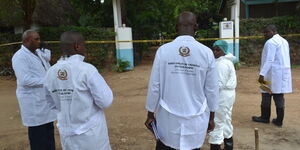DPP Noordin Haji on Wednesday revealed that his office had set its sight on the infamous Hessy group that has been exercising jungle law, with numerous alleged unlawful killings attributed to them.
Haji was speaking at Kayole Social Hall, during a community dialogue meeting held with the aim of strengthening police and community relations to address criminality and police brutality.
"I will write to Inspector General Boinnet to investigate on the Hessy vigilante group," he asserted.
The mysterious social media user, claiming to be a plain-clothe police officer and going by the names Hessy wa Kayole, Hessy wa Dandora and Hessy wa Huruma, has been warning suspects, who often end up gunned down in cold blood.
DCI boss George Kinoti, also present at the meeting, made damning revelations about unlawful killings within the force.
During the dialogue-themed forum attended by various human rights activists and local residents, the head of the DCI went on to reveal that he had witnessed killings carried out by Kenyan police officers.
"I acknowledge it happens (unlawful killings), some of us do it," Kinoti disclosed.
"I acknowledge that the police kill innocent civilians unlawfully and it is a fact because I have seen it," he added.
Despite his utterances, the DCI boss stated that the police force was ready to be shamed for their criminal behaviour by the independent oversight committees as well as human rights groups.
In addition, Kinoti affirmed that he would never defend any unlawful killings by any member of his police force.
“I stand before God if myself or anybody who will ever cover for someone who has killed an innocent person, let God curse me. I am saying no one will ever cover for a police officer who kills under my watch," he affirmed.
One participant told a chilling story of Sammy, a 14-year-old boy who was killed on December 25, 2018, and the police who committed the gruesome act admitted, bragging there was nothing that his mother could do about it.
DPP, on his part, urged the community to be part of the solution by willingly providing evidence regarding criminals as well as rogue officers.
Haji, while reacting to a question that young people were often arrested without cause, revealed that there was a new format regarding how individuals were supposed to be charged.
“Police will be required to indicate the reason for the arrest, prosecution, and evidence available,” he divulged.
He went on further to assure that whistleblowers afraid of being victimized by the rogue officers would be placed under witness protection.
The open dialogue in Kayole was a combined initiative by the two offices, aiming at meeting and listening to community concerns and coming up with sustainable solutions that encourage positive interactions between the community and the criminal justice sector.












